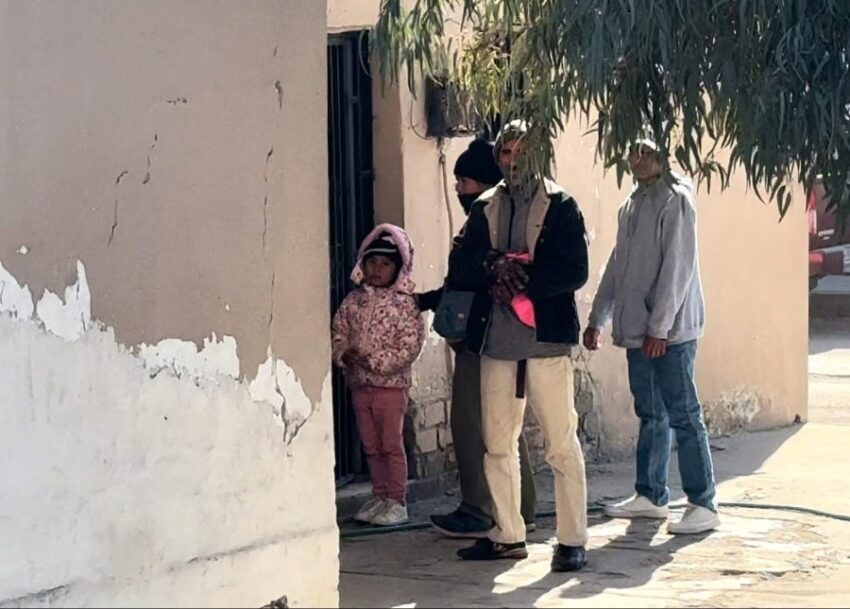JUAREZ, Mexico (Border Report) – Sitting on the steps of a government office in Juarez a stone’s throw from the Rio Grande, Ana Garcia is ready to say goodbye to the American dream.
The Guatemalan mother of two came to Juarez a month ago hoping to get an asylum appointment in El Paso and travel to New York, where a friend had a job waiting for her.
But President Donald Trump on Monday did away with an online tool that has allowed just under 1 million migrants to lawfully enter the United States while their claims are evaluated. That left her and an estimated 3,500 to 4,000 asylum-seekers stranded in Juarez.
“Some are saying they will wait, but I want to return to Guatemala,” Garcia said on Friday. “Thank God I am not in debt. I sold all my things to get here. I have my two kids in Guatemala and as long as I can go back whole, I can start again.”
Garcia is among the minority when it comes to what would-be asylum-seekers in Juarez are planning to do. Migrant advocates and most migrants interviewed Friday by Border Report say they plan to stay on the border for the next few weeks or months even amid dwindling options to enter the United States.

“There is a percentage of people thinking of waiting out a few months. They want to see how the situation evolves,” said the Rev. Yiyo Heredia, director of Hope Center migrant shelter in Juarez. “Another group is determined to leave in the next few months. I’d say 3 out of 5 plan to stay.”
The shelter that can accommodate 76 guests is almost at capacity. And that’s just with the asylum-seekers. If the U.S. begins mass deportations, neither this nor other refuges in Juarez will be able to assist all of them, he said.
Many of the asylum-seekers either sold their property or became heavily indebted to come to the border; others say the economic and political situation in their country is so bad they can no longer survive there. Turning back is not an option.
“I have an arrest warrant for treason,” said Francisco Javier Esqueda, a former Venezuelan police officer. “The (police) director sent me to beat up people during the election protests. I have a 30-year prison sentence waiting for me.”
Esqueda was waiting for an asylum appointment in El Paso when the U.S. government shut down CBP One, the online tool to procure one. He believes he has a strong case based on political persecution by the Venezuelan government for refusing to violate citizens’ human rights.
He said he will stay at Heredia’s shelter until he figures out a way to present his case in U.S. immigration court.

Bisneydies Romero said she, too, was targeted by sympathizers of the Nicolas Maduro regime for participating in street protests last year after the presidential election was allegedly stolen from opposition party candidates.
She said she fears for her safety if she goes back. She already went through so many traumatic experiences on the way to the U.S. border to risk harm again, she said.
“I saw a lot of dead people in the jungle and survived. I was kidnapped in the jungle [….] I suffered with my son and my husband on top of the train (in Mexico). It was so cold I got sick and I’m waiting to see a doctor” in Juarez, she said.
Romero said she hopes Trump has a change of heart when it comes to legitimate asylum-seekers. If not, she would like to see the United States help Venezuelans end the Maduro dictatorship she and other emigres say has led to the displacement of millions from the country.
She would also like to see something done about the Colombian and Panamanian gangs besieging the Darien Gap where hundreds of thousands of migrants have crossed in the past few years on their way to the United States.
“All migrants are targeted,” she said. “They tell you to pay a tax to pass through. They touch the women […] I got sick with asthma, and I was not violated, but they touched the other women.”
The Rev. Heredia said his shelter provides comfort and a safe place for those who endure much while seeking a better life in the United States. He said he cannot control what goes on with U.S. immigration policy, but at least he tries to keep the migrants from smugglers in Mexico.
The shelter has electronic locks and only allows guests to leave to look for work or bring groceries. He doesn’t want them to hang around outside, where the smugglers can approach them with offers of getting them over the wall or recruit them to work for the cartels.
 Read: Read More
Read: Read More




